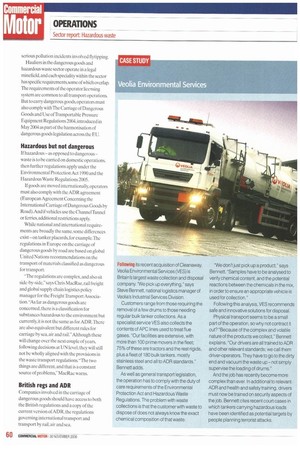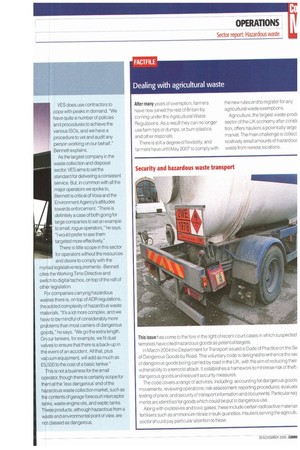Veolia Environmental Services
Page 60

Page 61

If you've noticed an error in this article please click here to report it so we can fix it.
Following its recent acquisition of Cleanaway, Veolia Environmental Services (VES) is Britain's largest waste collection and disposal company. "We pick up everything," says Steve Bennett, national logistics manager of Veolia 's Industrial Services Division.
Customers range from those requiring the removal of a few drums to those needing regular bulk tanker collections. As a specialist service VES also collects the contents of APC lines used to treat flue gases. "Our facilities are extensive, with more than 100 prime movers in the fleet: 75% of these are tractors and the rest rigids, plus a fleet of 180 bulk tankers, mostly stainless steel and all to ADR standards," Bennett adds.
As well as general transport legislation, the operation has to comply with the duty of care requirements of the Environmental Protection Act and Hazardous Waste Regulations. The problem with waste collections is that the customer with waste to dispose of does not always know the exact chemical composition of that waste. "We don't just pick up a product," says Bennett. "Samples have to be analysed to verify chemical content, and the potential reactions between the chemicals in the mix, in order to ensure an appropriate vehicle is used for collection," Following this analysis, VES recommends safe and innovative solutions for disposal.
Physical transport seems to be a small part of the operation, so why not contract it out? 'Because of the complex and volatile nature of the products we collect," Bennett explains. "Our drivers are all trained to ADR and other relevant standards: we call them driver-operators. They have to go to the dirty end and vacuum the waste up-not simply supervise the loading of drums."
And the lob has recently become more complex than ever. in additional to relevant ADR and health and safety training, drivers must now be trained on security aspects of the job. Bennett cites recent court cases in which tankers carrying hazardous loads have been identified as potential targets by people planning terrorist attacks, VES does use contractors to cope with peaks in demand. "We have quite a number of policies and procedures to achieve the various S0s, and we have a procedure to vet and audit any person working on our behalf," Bennett explains.
As the largest company in the waste collection and disposal sector VES aims to set the standard for delivering a consistent service. But, in common with all the major operators we spoke to, Bennett is critical of Vosa and the Environment Agency's attitudes towards enforcement. "There is definitely a case of both going for large companies to set an example to small, rogue operators," he says. "I would prefer to see them targeted more effectively,".
There is little scope in this sector for operators without the resources and desire to comply with the myriad legislative requirements -Bennett cites the Working Time Directive and switch to digital tachos, on top of the raft of other legislation.
For companies carrying hazardous wastes there is, on top of ADR regulations, he added complexity of hazardous waste materials. "It's a lot more complex, and we have to be mindful of considerably more problems than most carriers of dangerous goods," he says. 'We go the extra length. On our tankers. for example, we lit dual valves to ensure that there is a back-up in the event of an accident. All that, plus vacuum equipment, will add as much as £5500 to the cost of a basic tanker."
This is not a business for the small operator. though there is certainly scope for them at the 'less dangerous' end of the hazardous waste collection market, such as the contents of garage forecourt interceptor tanks, waste engine oils, and septic tanks. These products, although hazardous from a waste and environmental point of view, are not classed as dangerous.


















































































































































































